This interview is part of our interview series, where we curate stories of regular people that decided to design a life they love. (click here to learn more).
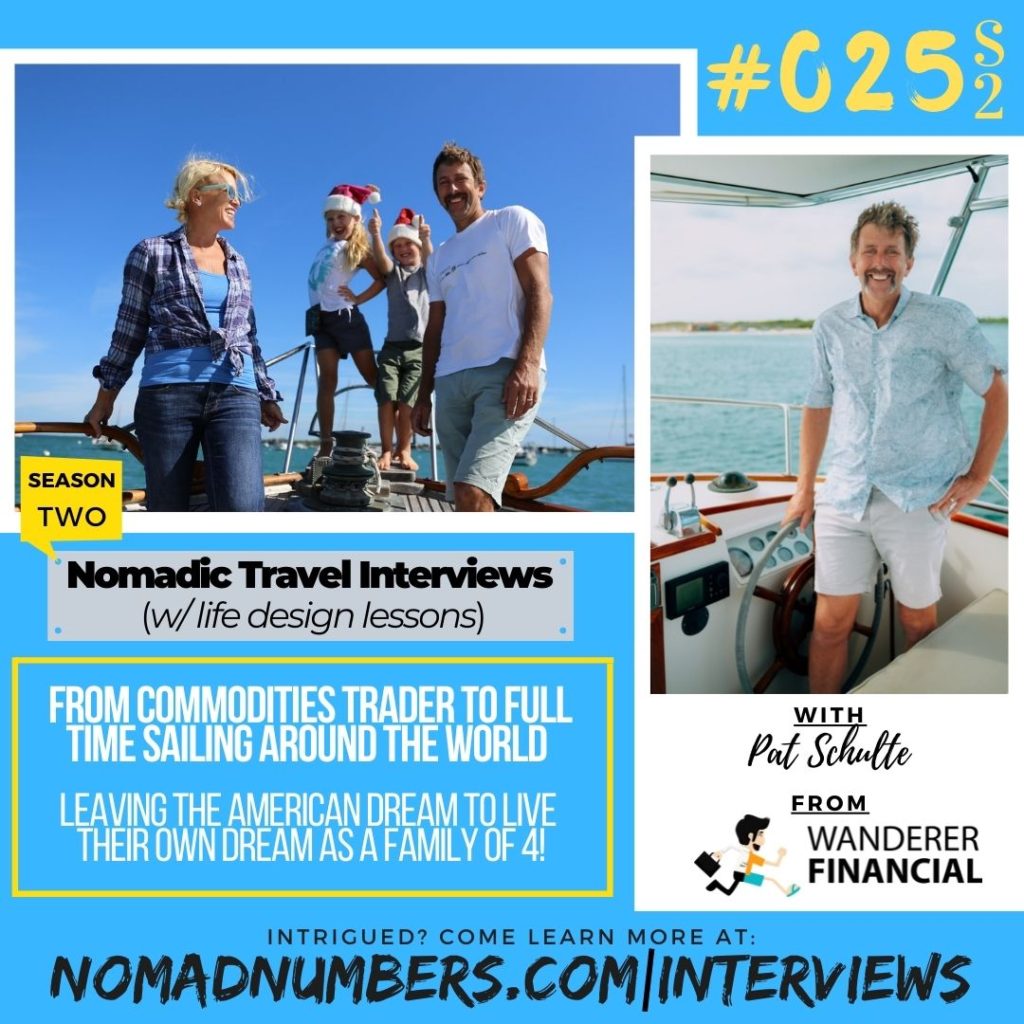
Pat Schulte from Wanderer Financial
Some links to the products mentioned below are affiliate links, meaning that if you click and make a purchase, we (Nomad Numbers) may receive a commission at no additional cost to you. For more information please review our disclaimer page.
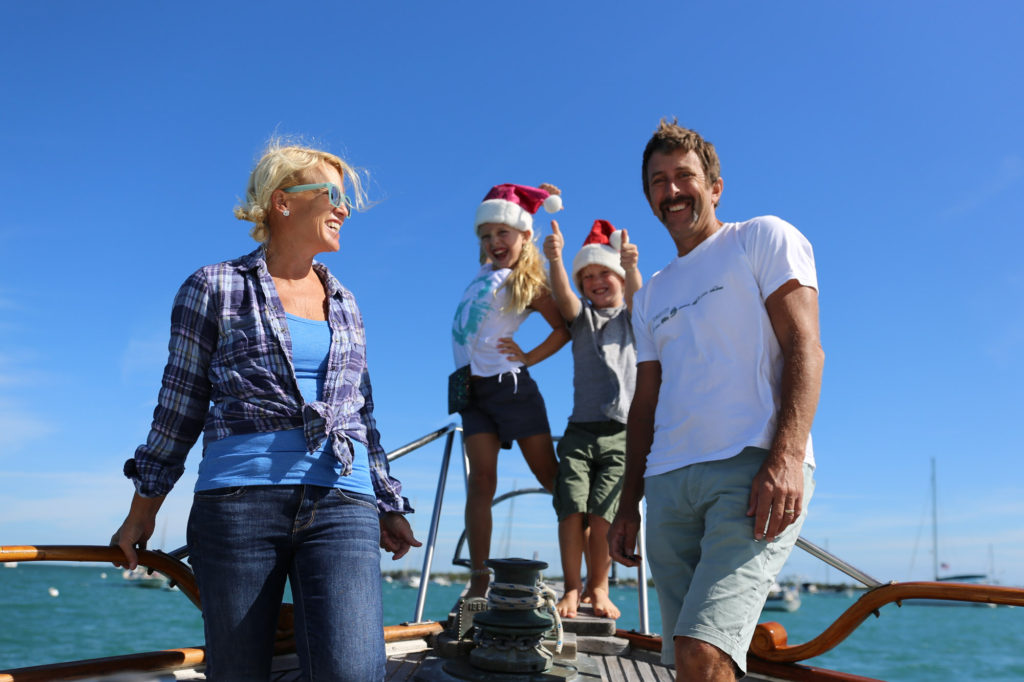
1. Can you introduce yourself?
Hi, I’m Pat Schulte, along with my wife Ali, twelve-year old daughter, and ten-year old son. My wife and I began full-time traveling at 29 and nearly twenty years have passed since then. We grew up in Minnesota, USA, began dating in high school, and married after college. We led a very typical suburban existence.
I knew early on that I wanted to be a trader—one of those guys you see on tv screaming and yelling at each other all day. I went to school for Finance and Economics, and took the most basic entry level job imaginable in order to get my foot in the door after college. Within a couple of years I was an independent trader and we moved to Chicago where the real action was in my business (commodities trading).
Chicago was a success. We enjoyed the downtown life, and were doing very well financially. By all accounts we should have been thrilled with our rise up the American Dream ladder. But at twenty-eight the doubt crept in and we began to question, “What is the point of all of this?”
We decided our life needed a story—an adventure. Something big. The kind of story you can tell at dinner parties for the rest of your life. We literally talked this over together in one night, and by closing time our path was set.
We’d never been on a sailboat before, but that didn’t stop us from choosing to sail around the world. There’s not many adventures bigger than that. In no time, we had bought a boat, sold everything we owned, quit working, and sailed to the Bahamas.
Our plan in the beginning was to sail around the world, then return to Chicago, and pick up right where we left off. But it wasn’t long before we had determined that we would never go back. This life of adventure and new experiences was what we now wanted more than anything else.
For four years we crossed oceans, visited interesting places, and met incredible people. We closed the loop as circumnavigators, and then set off for the next big thing. We spent the next couple of years as what today are known as vanlifers. We traveled in our 1958 VW bus from Alaska to Argentina, rode across the Atlantic on a cargo ship, and continued across Europe.
During that time my wife became pregnant. We sold the VW, and headed to Mexico where we would end up having two children and raise them on our second boat.
The kids grew up on the water until we decided it was time to show them some of what life on land has to offer. We sold the boat, bought a motorhome, and spent the next three years criss-crossing the US and Mexico.
Five years ago we switched back to boat life again. We’ve been cruising in our Grand Banks trawler all over the Caribbean ever since.
My wife and I still call the US our home, but our kids are truly children of the world. They hold two passports, speak two languages, and have never grown roots on land. We are now planning our second circumnavigation.
2. What does a typical day in your life look like for you today? How does it differ from your life before?
My life is considerably different today than I would have ever dreamed it would be. It really isn’t even remotely similar to my pre-nomad days.
Back in my Chicago life I’d wake up, walk ten minutes and be on the trading floor at 9:15. I’d trade until the market closed at 1:30. I’d go home, run through my day’s trades, and hop online for a couple of hours to read travel blogs until it was time to pick my wife up from her job up the street at 5:00. We’d walk somewhere for dinner, then head home. In Chicago it would be dark by now. We’d plop down on the couch, watch tv, and go to bed. Super average life, as far as I’m concerned.
These days a typical day is not average. I wake up without a clock, at anchor, on an island in the Caribbean. Have coffee on the top deck as the sun comes up. An hour or so before the market opens I start up the daily chatroom for my subscribers at Wanderer Financial and give a brief rundown of the overnight markets. Spend 3-4 hours working, which includes trading, the live chat, writing, and any other business stuff that comes up. Close up shop for the day around lunchtime. Go snorkeling with my kids. Dinghy to shore, and walk to a beach bar for some dinner. Go back to the boat for drinks at sundown. Fall asleep shortly after dark. Down with the sun, up with the sun. That’s life on a boat.
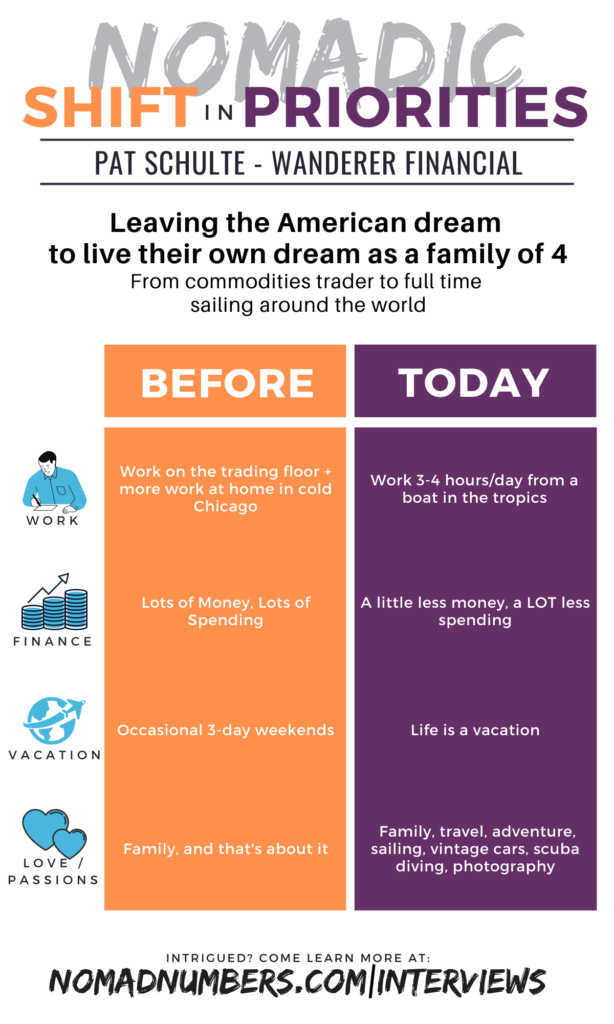
Life design journey
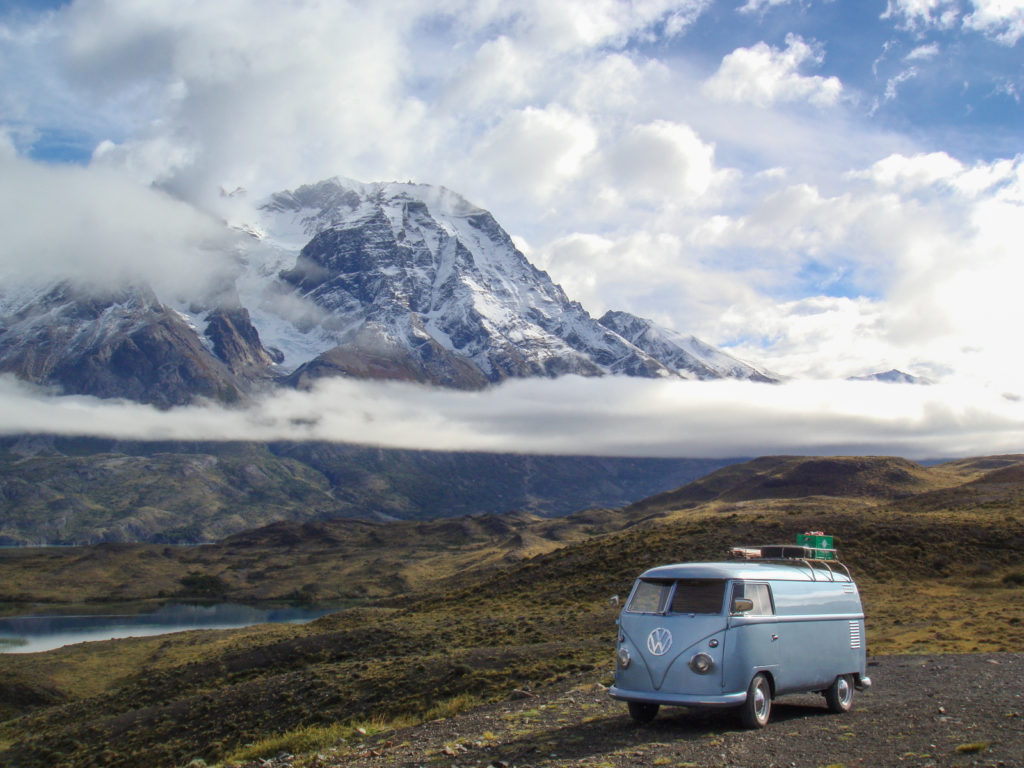
3. What inflection point led you to decide to change your life trajectory?
My wife and I were twenty-eight years old and living in Chicago. This was back in 2003, when the internet was still relatively new. There weren’t a million youtube channels and websites dedicated to a life of travel and adventure. So I consider it serendipitous that I stumbled across a Backpacking blog website where travelers left “diary” type entries each day.
I would come home from work, hop online, and read about eighteen year old kids having amazing adventures in far-off lands with hardly a penny to their names. I was ten years older, had money in the bank, and yet I hadn’t had any sort of adventure like these. Meanwhile, our friends were moving out of the city, into the suburbs, and having kids. It seemed we had two choices remaining: continue to suburbia, or head off into the unknown.
It was these thoughts that led to our fateful conversation one Saturday night over pizza and beer. At the time we had no way of knowing that our decision that night would guide the next twenty+ years of our life.
4. What were some of the limiting beliefs that held you back initially?
Once our decision was made to sail around the world, nothing held us back. It was as if the decision had been carved in stone. The things that held us back all happened prior to that decision. We only realize it now in retrospect, but our life up to that point had been dictated to us from childhood. We had followed the path to the American Dream. We’d gone to school, gotten a job, gotten married, focused on financial success by working more, and were just one step from having kids, a white picket fence, and a one hour commute.
We had gone through life with blinders on. We were happy, though, and simply didn’t know any better. It had never even occurred to us that life didn’t have to follow a prescribed roadmap. Once it finally dawned on us that we didn’t owe that path to anyone, and that there were others available to us, we thought, “Geez, we could veer left at this little dirt road and see where it leads. Looks like it could be fun.”
5. What did you do to prepare the transition to this new destination and how did you do it?
Moving from a normal downtown Chicago lifestyle, and into a 35’ catamaran is a pretty dramatic turn. We set about selling everything we owned, with gusto. Furniture, gone. Televisions, gone. Golf clubs, winter clothing, down comforters, sold, sold, sold. That wedding present mantle clock with our anniversary inscribed on it, sold. At one point we even sold used shoes on eBay. People will pay a couple bucks for just about anything.
By the end we had a couple of boxes with photo albums and high school yearbooks as our only remaining personal possessions. Our family loaned us a pickup truck to drive down to Florida with when we first moved aboard. The boat broker was there to meet us when we first arrived. He looked at us and asked, “Where’s all your stuff? I thought you were moving aboard.” He’d never seen anyone arrive without a trailer full of junk before. Our life as minimalists had started without us even thinking about it
In the end, we never gave a second thought to any of the things we had gotten rid of. People that have downsized dramatically will almost always say the same thing. Not being tied down by belongings is a big reason we’ve been able to make so many dramatic life changes in the ensuing years. When our family of four decided to move off our boat in Mexico and into a motorhome in the US, we packed all our belongings in four plastic bins, hopped on a plane with one each, and started over a day later without having left anything important behind.
6. Once on the journey, what were some of the biggest wins you realized? What were the challenges you had to face along the way?
Right off the bat I realized how much healthier and happier I was just from being outdoors so much. When you live on a boat in tropical weather, you don’t spend much time cooped up. It’s also a physical lifestyle. Without even trying, it’s easy to stay in shape and feel good.
It was also great to just be with my wife all day, off having fun and adventures together. The normal idea of being apart for ten hours plus each day so you can earn money to spend together on the weekends isn’t exactly a recipe for a happy relationship.
7. How long did/will it take to reach the destination? Any advice to make the journey as enjoyable as possible?
The destination is a moving target. I know some digital nomads have a specific place in mind that they want to dig in and be able to call home. My family prefers to stay on the move, and to bring our home and digital office with us wherever we go. Sailboats and motorhomes have given us that ability.
8. What did the people around you (friends/family/colleagues…) think of your plan to take on this new life?
When I told my dad we were going to take off and sail around the world, the first words out of his mouth were, “Don’t you like your job?” The idea of leaving a “stable” job for an unknown future made absolutely no sense to him.
My father-in-law’s first reaction was, “How much does a boat like that cost?” To his mind, the biggest obstacle to the adventure we were about to undertake wasn’t sailing across forbidding oceans, it was the finances.
Because of my work as an independent trader I was forced to keep my secret until my last day in the trading pits. For a couple of weeks I had been slowly unwinding my trading positions, but if the other traders had known what I was doing they would have made that process much harder, and more costly, for me. We may have been friends, but we were also competitors. So on that last day I said goodbye to everyone, and I honestly don’t know if any of them believed me when I said I was leaving to sail around the world. But after the closing bell, when most everyone had left already, the biggest broker in the pit, a guy who had made upwards of $20m/yr for a couple of decades, put his hand on my shoulder and said with the deepest sincerity, “I wish I were you. I should have done the same thing when I was your age. Good luck.”
Cost of living
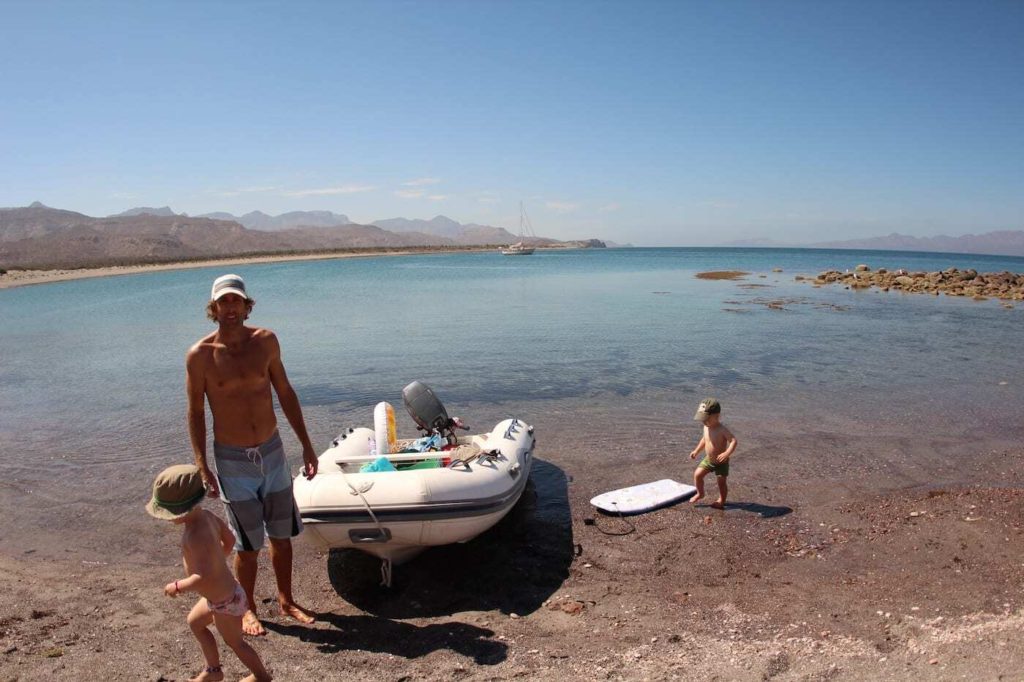
9. How much yearly expense did you have before and after this change in lifestyle?
Before leaving to go cruising we felt like we lived well within our means. That isn’t the same as living frugally. Not by a long shot. In Chicago my wife earned $50,000/yr, and I paid myself a base salary of $25,000 from my trading account. That was enough to pay our bills, but without saving any of it. We considered my trading account to be our savings and investments. After taxes our monthly spending breakdown fell somewhere in the $4,500 – $5,000 category.
There was basically no information on a sailboat cruising budget on the internet back then. We plugged in some guesses and came up with an estimate of $1,750/mo to sail around the world.
As it turns out, our monthly expenses came in at close to double that number. Cost for a Sail Around the World
Perhaps surprisingly we found that driving around the world broke down very closely with sailing. Cost to Drive the Americas
These days our expenses are roughly the same as our early cruising days, even as we live and travel the Caribbean with two children.
Accommodation expenses are our yearly boat maintenance costs and periodic marina fees. We paid cash for our boat, so there are no loan payments or interest. Because we don’t owe a bank we are also free to insure or not insure the boat. We choose not to pay insurance and instead prefer to own a boat that we can afford to lose. Not that it wouldn’t hurt the pocketbook if the boat was sunk, but our financial situation wouldn’t change dramatically, either.
Grocery expenses tend to fluctuate pretty wildly in the Caribbean from one island to another. We also tend to eat out quite a bit. It’s an indulgence we really don’t need, but is something we enjoy.
Being Americans means we have a hard choice to make—either we spend exorbitant sums of money to insurance companies in the event that we need medical care, or we go without. For nearly twenty years we have been uninsured. It’s difficult to justify US health insurance when you don’t live in the US. Our out of pocket expenses, even with two children, have been miniscule during all of this time. Unfortunately, it’s a gamble, and is one that American digital nomads have to grapple with individually. Meanwhile, virtually every other nomad we meet looks at us as if we are crazy for even having to think about it. Their question is almost always some form of, “But you pay taxes don’t you?”
Another regular large expense is cellular data. It’s gotten better, most places in the world, but data rates per gigabyte in the Caribbean are still astronomical compared to big countries.
| Category | Description | Monthly budget |
|---|---|---|
| Accommodation | Anything you pay toward keeping a roof over your head (ie. rent, internet, water, utilities…) | $700 |
| Alcohol | Anything related to alcohol you purchase | $125 |
| Groceries | Anything related to the groceries you get to cook at home | $1100 |
| Dining out / Take-out | Anything related to what you spend when dining outside of your home. | $600 |
| Activities / Entertainment | Anything you pay related to ‘fun money’ (ie. park fees, outdoor activity, AirBnB experience…) | $500 |
| Health Care | Any cost related to treatment you are receiving on a given location. | $20 |
| International Health / Travel Insurance | This is health.travel insurance that your purchase to get you covered outside of your home country | $5 |
| Local Transportation | Anything related to transportation within the boundary of the location you are staying at. | $125 |
| International Transportation | Anything related to transportation to go from one location to another. | $300 |
| Visa | Any cost related to a visa to stay in a given country. | $25 |
| Living expenses | Anything else that you are spending money on to live in a specific location that can’t fit anywhere else (ie. Haircut, Netflix, cell phone…) | $250 |
| Monthly total Yearly total | $3,750 $45,000 |
Lessons, tips & advices
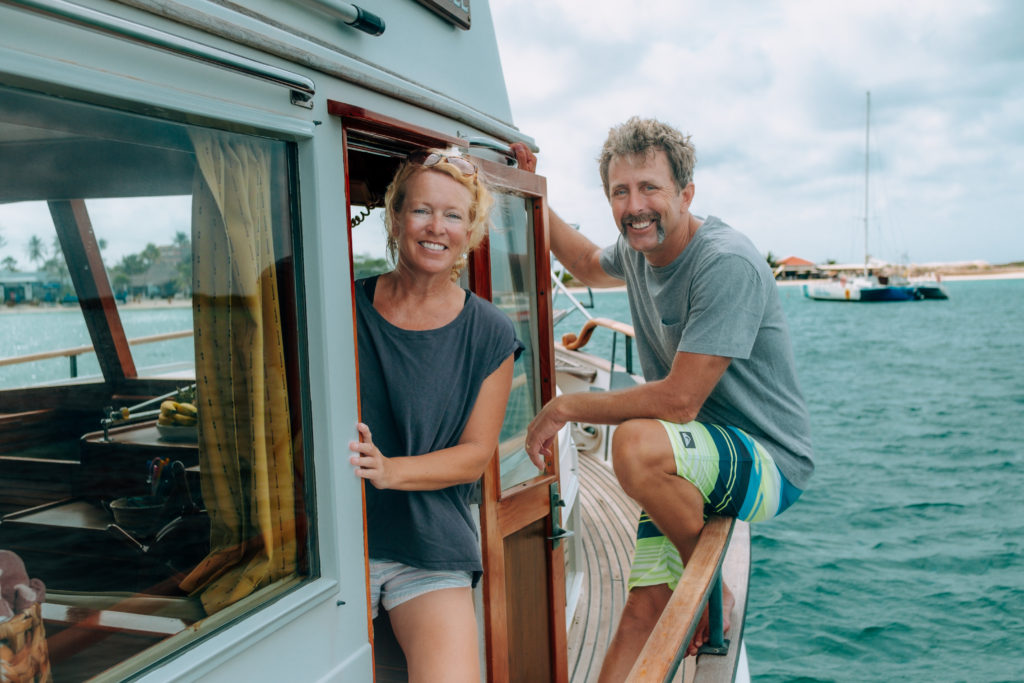
10. If you had to do it again, what would you do differently?
We really don’t have any regrets, but the one thing my wife always brings up is that if we had known from the start that we would go off and live this way, we would have lived extremely simple back in our Chicago working days. We wouldn’t have bothered with fancy furniture, an unnecessary car, or the constant shuffling of new clothes through the closet. We’d thrown a mattress on the floor, worn out our clothes, and not accumulated anything, other than a bigger bank account, until it was time to go. And despite having left for good at 29, we’d have preferred to go even sooner.
11. What advice do you have for others who are considering going through a life design exercise?
My advice is simply for people to recognize that nothing in life has to be forever. Take chances. If the first one doesn’t work out the way you wanted, or you find it’s different than you expected, don’t be afraid to start again or move on.
Looking ahead
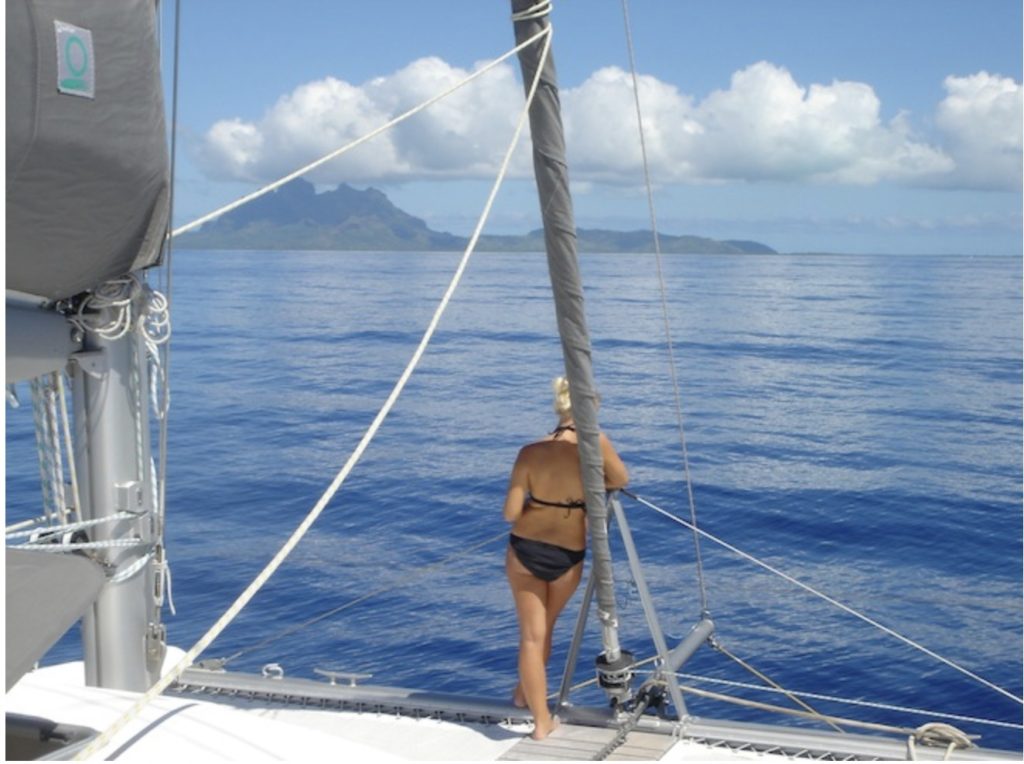
12. What is next for you?
We’re smack dab in the middle of switching boats again. Our trawler was the perfect boat for the Caribbean, but we’re planning on sailing around the world again, now, so we are in the process of buying a catamaran sailboat. Sailing around the world will likely consume the next five years of our life.
Thank you so much Pat for sharing your transformational life design journey with us. It is quite remarkable to see how far your life has brought you and how you managed to get yourself unstuck from the “American dream”. I am confident that this story will be one that will resonate with our readers, so thank you very much for taking the time to answer all of our questions! Sailing has been something that my wife has had the chance to do once in her life and she loved it, so when the opportunity comes, I’ll definitely give it a try, and who knows… Maybe one day our path will cross. Be well and good luck taking on the next catamaran sailboat adventure.
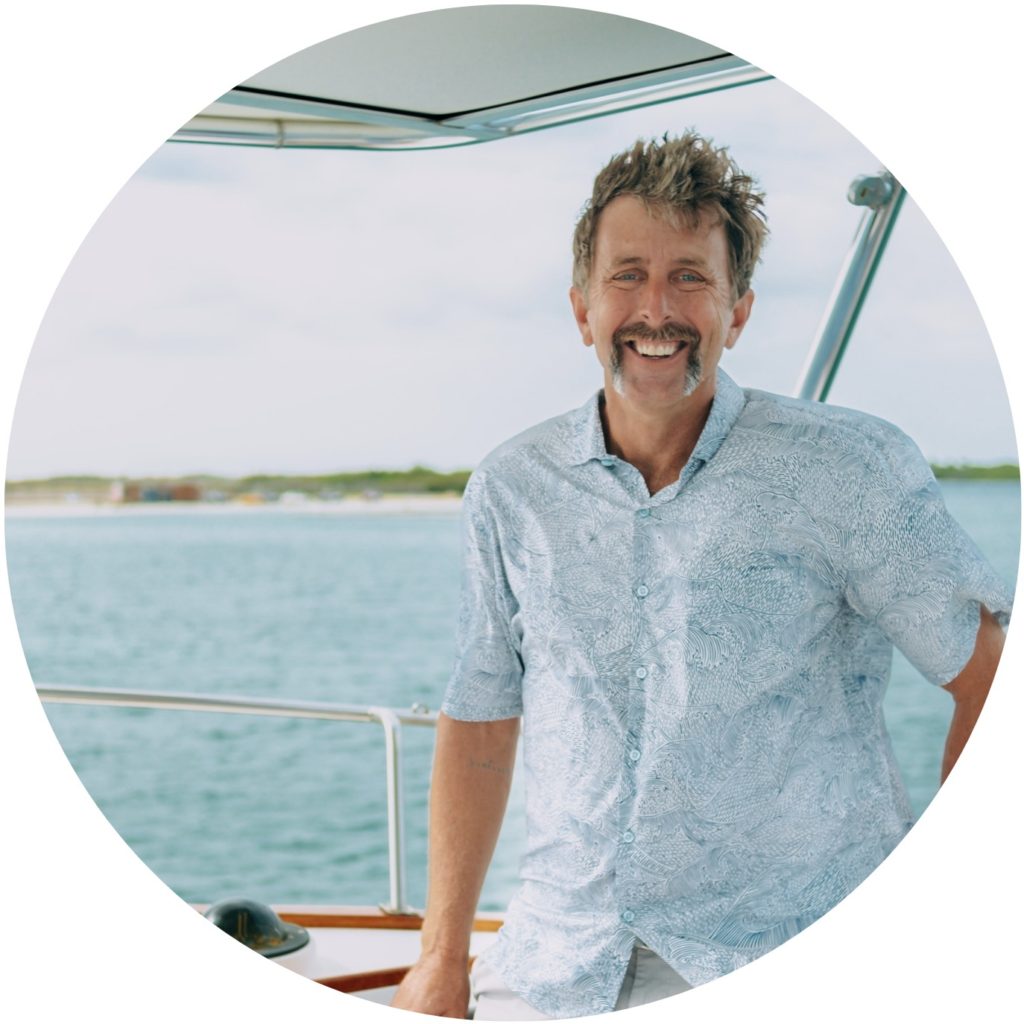
If you want to know more about Pat Schulte, you can find him on the following platforms:
Blogs
- Pat and his family have been blogging about their travels at www.bumfuzzle.com non-stop since they first left back in 2003
- www.wandererfinancial.com for those interested in learning to invest for their adventures.
Facebook: Bumfuzzletravels
Instagram: Bumfuzzles
Rapid-fire questions
We like ending every interview by asking some fun rapid-fire questions to our guests
| What is your superpower & why? | The ability to veer off course at any moment. I’ve got total belief that I’ll somehow make it work. This is strengthened by the fact that I’ve got a spouse with the same power. |
| What is your favorite travel destination & why? | This always feels like a cop-out because it is such an easy destination, but nothing beats Mexico for us. After seventy-ish countries around the world, we always find ourselves returning to Mexico. The people and the food are the best. And by moving around the country you can find perfect weather somewhere any time of year. If it gets too hot on the coast, go to Mexico City, or Guadalajara, or San Miguel de Allende, which are all up at elevation. Looking for beach life? There are a hundred great destinations. |
| What is the best Amazon (or online) purchase you made this past year? (Provide a link to Amazon or the product page) | Inflatable kayak for the kids. This thing is cheap, and yet paddles well and holds up to an insane amount of abuse. |
| What is the best Airbnb (or similar) you ever lived in and why? | Great place in the heart of Antigua, Guatemala. It was a Spanish colonial building, hundreds of years old, with a rooftop patio overlooking the surrounding volcanoes, a central courtyard for the kids to play, and it was within a couple of blocks of the central square. |
| What’s something you can never live without? | My family. There is literally not one item that comes with a price tag that I can’t live without. |
| What’s the best piece of advice you’ve received? | Don’t be afraid to speak up. There are countless times in life where speaking up is the right thing to do. In addition to speaking up when someone is doing something wrong, speaking up and asking for something that you want will, more often than not, result in you getting it. |
Our Bottom Line
Here are the main lessons we took away from this interview with Pat:
- Lesson 1 – “We decided our life needed a story—an adventure. Something big!” – After sticking to a typical American Life, this was the wake up call from Pat and his wife that led them to travel and pivot their entire life by putting travel as the center of it. So what is your life story? And are you happy with its current narrative or are you taking the lazy road or having the same story as anyone else?
- Lesson 2 – “In the end, we never gave a second thought to any of the things that we had gotten rid of” – A great realization that materialistic possessions aren’t always something we really need (or even want!). If you do purchase a lot of stuff, do you really need them in the first place?
- Lesson 3 –”It was also great to just be with my wife all day, off having fun and adventures together” – Spending time with the people we love doing what we love together seems like a wonderful place to be. For Pat and his wife this was just about seeing things differently, while even spending less down the road!
Sometimes we need to hear about others making unconventional decisions before we can have the confidence to make our own. If you have (or are on a path to) an unconventional journey to improve your life that has a nomadic component to it and are interested to share it, please reach out to us as we would love to consider your story for our blog.
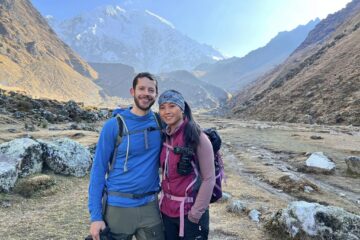
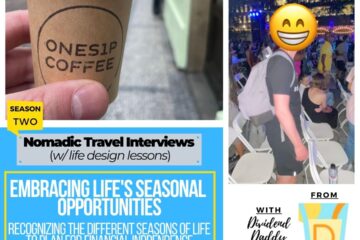
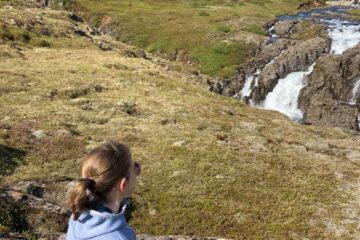
4 Comments
Christine · July 4, 2022 at 7:59 pm
Excellent article. I am curious what age ranges your kids where in each of the major phases.
Patrick · July 15, 2022 at 1:32 pm
Hi. My kids were essentially born to the boat they lived on until they were 2 and 4. They then spent 3 years in motorhome life. At about 5 and 7 we began cruising the Caribbean. And now at 10 and 12 they’ll be setting out with us to sail around the world.
Christine · July 15, 2022 at 2:47 pm
Since I posted this I have perused your Facebook page. As a sailing “curious” person I am considering taking a RYA competent crew class. Or would you have another recommendation?
So far my sailing experiences are being on this little (15ft) sailboat my dad had when I was a kid. He ended up dumping it one day and losing the sail in the bottom of the lake. End of that hobby. We also been passengers on a few four hour charters. The most enjoyable and memorable in Bayfield, WI.
Patrick · July 15, 2022 at 3:22 pm
Hi Christine, by all means take some sailing courses. We took Sailing 101 which was just a couple of hours on Lake Michigan, and we pretty much immediately thought, “Yeah, this isn’t so complicated, let’s go.” Bought a boat and took off for the Bahamas. But, it is definitely a good way to see if you really like the feel of being on the water. And hey, it never hurts to learn a new skill. Good luck. Be sure to check out our travel blog bumfuzzle.com as well. You can go all the way back to the beginning in 2003 to see what it was like for two total newbies.